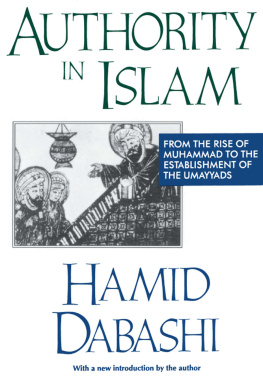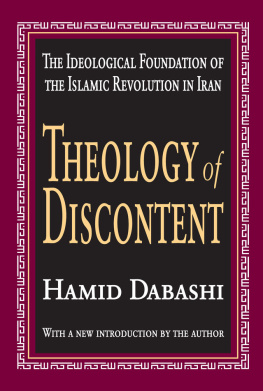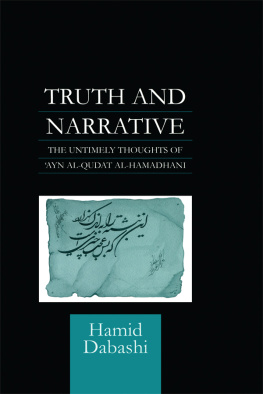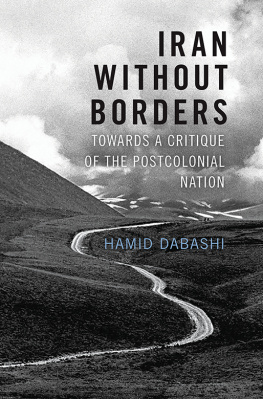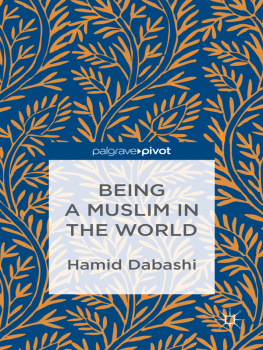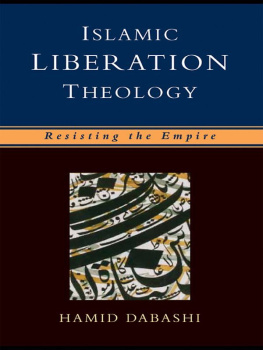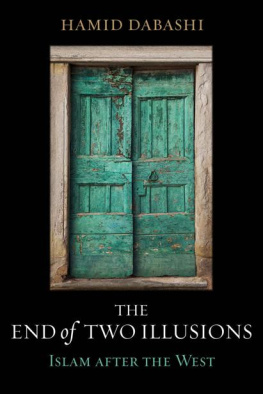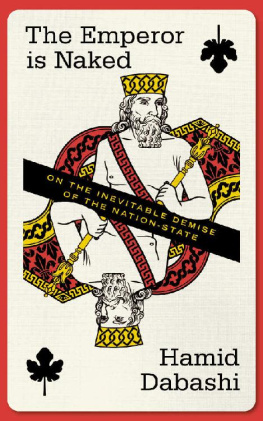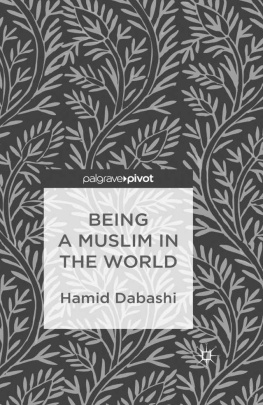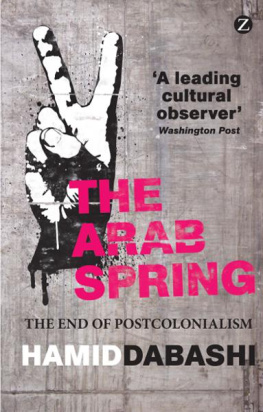Hamid Dabashi - Authority in Islam
Here you can read online Hamid Dabashi - Authority in Islam full text of the book (entire story) in english for free. Download pdf and epub, get meaning, cover and reviews about this ebook. year: 2017, publisher: Taylor and Francis, genre: Religion. Description of the work, (preface) as well as reviews are available. Best literature library LitArk.com created for fans of good reading and offers a wide selection of genres:
Romance novel
Science fiction
Adventure
Detective
Science
History
Home and family
Prose
Art
Politics
Computer
Non-fiction
Religion
Business
Children
Humor
Choose a favorite category and find really read worthwhile books. Enjoy immersion in the world of imagination, feel the emotions of the characters or learn something new for yourself, make an fascinating discovery.
- Book:Authority in Islam
- Author:
- Publisher:Taylor and Francis
- Genre:
- Year:2017
- Rating:5 / 5
- Favourites:Add to favourites
- Your mark:
- 100
- 1
- 2
- 3
- 4
- 5
Authority in Islam: summary, description and annotation
We offer to read an annotation, description, summary or preface (depends on what the author of the book "Authority in Islam" wrote himself). If you haven't found the necessary information about the book — write in the comments, we will try to find it.
Authority in Islam — read online for free the complete book (whole text) full work
Below is the text of the book, divided by pages. System saving the place of the last page read, allows you to conveniently read the book "Authority in Islam" online for free, without having to search again every time where you left off. Put a bookmark, and you can go to the page where you finished reading at any time.
Font size:
Interval:
Bookmark:
Authority in Islam
Authority in Islam
From the Rise of Muhammad to the Establishment of the Umayyads
Hamid Dabashi
With a new introduction by the author

First published 1989 by Transaction Publishers
Published 2017 by Routledge
2 Park Square, Milton Park, Abingdon, Oxon OX14 4RN
711 Third Avenue, New York, NY 10017, USA
Routledge is an imprint of the Taylor & Francis Group, an informa business
Copyright 1989 by Taylor & Francis
All rights reserved. No part of this book may be reprinted or reproduced or utilised in any form or by any electronic, mechanical, or other means, now known or hereafter invented, including photocopying and recording, or in any information storage or retrieval system, without permission in writing from the publishers.
Notice:
Product or corporate names may be trademarks or registered trademarks, and are used only for identification and explanation without intent to infringe.
Library of Congress Catalog Number: 92-3313
Library of Congress Cataloging-in-Publication Data
Dabashi, Hamid 1951
Authority in Islam: from the rise of Muhammad to the establishment of the Umayyads / Hamid Dabashi
p. cm.
Originally published: 1989. With a new introd.
Includes bibliographical references and index.
ISBN 1-56000-586-6 (paper); 0-88738-288-6 (cloth)
1. Authority (Islam)History of doctrines. 2. IslamHistory I. Title.
BP165. 7.D331992
306.6 97dc20
92-3313
CIP
ISBN 13: 978-1-56000-586-5 (pbk)
For my wife Afsaneh,
who makes it all possible,
and for our children,
Kaveh and Pardis,
who make everything else worthwhile
Contents
In the final paragraphs of my conclusion to Authority in Islam, I began to work my way through a recognition of the three metaphysical paradigmatics of enduring authority I have identified in this book not merely as sectarian divisions within the early Islamic body politic but more important as three frames of reference, states of mind, modalities of power, modes of authority, readings of the Muhammadan charismatic experience (see 158 of this book) active and operative throughout Islamic history. Although I had worked my way towards those final observations through the preceding chapters that dealt specifically with the Sunnite, Shiite, and Kharijite conceptions of authority in Islam, at the conclusion of the text I realized that there had appeared avenues of further theoretical observations much beyond what I was then ready to see or suggest.
My primarily theoretical concern with early Islamic history began with the perennial Weberian question of legitimate authority: When and why do men obey? Upon what inner justifications and upon what external means does this domination rest? (Weber 1946, 78). Based on the initial confrontation between the two conflicting paradigmatics of authority, the traditional Arabian and the charismatic Muhammadan, I saw the emergence of three (almost) simultaneous subparadigmatics of legitimate continuity that extended the initial Muhammadan charismatic experience into the rest of Islamic history. The possibility of seeing these three metaphysical paradigmatics of legitimate authoritycode named the Sunnite, the Shiite, and the Kharijite in their historical and doctrinal identitiesthen gave me the unprecedented possibility of looking at Islamic history as the successive, simultaneous, and relentless unfolding, in a dialectic of cross-referential anxiety, of structural (re)orderings of command and obedience narrated in an active and legitimate range of discoursespolitical and otherwise. The detection and implications of this theoretical perspective on Islamic history, from the specific standpoint of a sociology of authority, needs some further elaboration. I would like to take the opportunity of writing a new introduction to Authority in Islam to work through some of these suggestions. Before I do that, it is equally necessary to dwell for a moment on the nature and function of the theoretical language I have adopted in this book.
The sociological language adopted in this text has its distinct historical exigencies. It is a language that goes beyond Weber by virtue of the fact that it is more intimately informed by the Islamics. At the same time, it goes beyond the customary, and still by and large dominant, positivistic paradigms in the Orientalist discourse by virtue of the fact that it takes (in)directions of the sociological imagination seriously. Defining that critical path between sociological imagination and positivistic facticity has its distinct perils and promises. It represents a postcolonial release, deliberately comfortable with both Weber and the Islamics, from both the denigrating and distorting language of Orientalism and the unwarranted anxieties of adapting a Western sociological language to an Islamic phenomenon. In that release, the wide marginal space between mainstream (American/demographic) sociology and the (still largely Orientalist) Islamics, there is no hidden or manifest agenda to prove either Orientalism wrong or Weberian sociology right. In that wide, comfortable, and rather spacious, margin, the field of my operation in this (and all my other) text(s), the probing force becomes a distinct and identifiable theoretical voice in search of a particular insight into the historical and existential (as opposed to stereotypical and essentialist assumptions about the) experiences of a people. Both primary and secondary sources, both the (in) directions of the sociological imagination and the specifics of the Islamics, become fused and subsumed under the more significant emergence of a theoretical voiceconfident in its points of origin, free in following the directions of its independent judgmentsthat speaks clearly and succinctly to realities under its investigations, as it echoes the collective insights of other theoretical voices that sustain and energize it.
Assumptions and consolidations of polemical positions on an epistemologically dichotomous bifurcation between such politically necessitated abstractions as First World theory and indigenous theory (Spivak 1990, 69) are simply false. They are the critical extensions of ideological posturings in some particularly acute and dominant postcolonial anxieties and as such detrimental to an independent and emancipated pursuit of a legitimate theoretical voice. Weber, let alone that empty abstraction called Western Sociology, did not invent the sociological imagination. With Samuel Klausner I read The Book of Hosea, with Philip Rieff Kafkas In the Penal Colony, among any number of other similar immortal texts, all in courses in Sociological Theory. With my own students I have read Ibn Khaldun and Nizam al-Mulk cover to cover with Weber and Durkheim. I rather think that Ibn Khaldun would have enjoyed reading Weber, or Weber Nizam al-Mulk. That they did not, or that my American colleagues may not read Ibn Khaldun and Nizam al-Mulk or my Muslim colleagues may not read Weber and Durkheim, does not, by virtue of any political pronouncement, constitute and artificial barrier for me who reads them allin their originals. In my mind, Weber, Ibn Khaldun, Durkheim, and Nizam al-Mulk, among other great visionaries of the highest, as Philip Rieff used to call them, dwell comfortably and read each others texts conveniently. The theoretical voice that is thus engendered and sustained in my work, the hesitant child of those very confident fathers, addresses one reality or another in the antiquity or modernity of Islamic history. That voice is not, and should not be, reducible to one or the other side of that anxiety-provoking imaginary line that divides the immortal texts of our Republic of Intellect into First World theory and indigenous theory. The success (or failure) of that voice in addressing something beyond the reach of the Orientalist discourse, as beyond the reach of Euro-American centricity in sociological imagination, is measured only by the range and veracity of the theoretical language it crafts and speaks. The test of that veracity is very simple: Could we now know something quintessentially different about the accumulated data than we did before? Does the application of this theoretical discourse make the mute facts speak a hitherto unspoken meaning and significance?
Next pageFont size:
Interval:
Bookmark:
Similar books «Authority in Islam»
Look at similar books to Authority in Islam. We have selected literature similar in name and meaning in the hope of providing readers with more options to find new, interesting, not yet read works.
Discussion, reviews of the book Authority in Islam and just readers' own opinions. Leave your comments, write what you think about the work, its meaning or the main characters. Specify what exactly you liked and what you didn't like, and why you think so.

